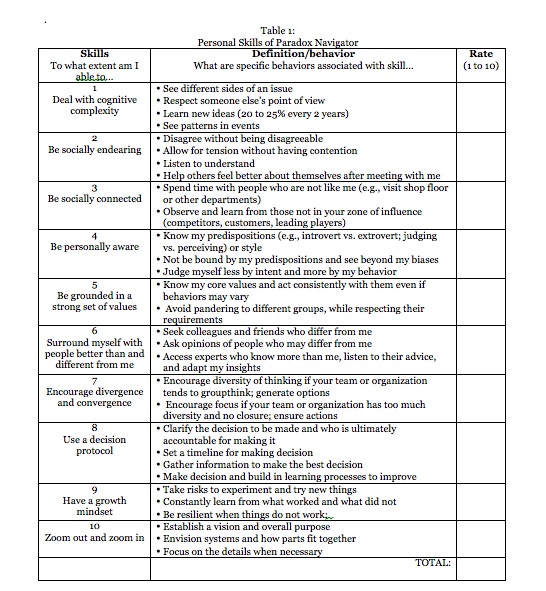
There are innumerable evolutions in how to train leaders to be more effective: online or e-learning, action learning, learning solutions, 360 feedback, gamification, case studies, live case studies, facilitated discussion, leaders as trainers, field experiences, teambuilding, personalized self-learning portals, microlearning apps, virtual reality, and so forth. These multiple methods for improving leadership continue to proliferate, creating multiple pipelines for leadership improvement.
In many ways, the greater challenge for upgrading leadership is not how to train, but what. Are the innovations in how to train matched by the innovations in what to train? Antiquated or dated leadership knowledge and skills taught with innovative techniques likely will not improve leadership.
So what do effective leaders need to know and do in a disrupted modern business setting of new social, technological, economic, political, environmental, and demographic conditions? How do leaders respond to increasing rates of volatility, uncertainty, complexity, and ambiguity (VUCA)? How do leaders meet increasing expectations of all stakeholders (employees, investors, customers, communities)?
What makes an effective leader has both stayed the same and evolved.
In our work on leadership (see “Leadership Code,” “Leadership Brand,” and “Leadership Capital Index),” we found that about 60 to 70 percent of effective leadership is relatively basic tools and 30 to 40 percent represents the unique requirements of a leader tailored to a firm strategy, industry conditions, customer expectations, and investor requirements.
Evolution of Leadership
When we wrote the “Leadership Code,” we synthesized ten thousands of leadership studies, models, tools, and frameworks into five core domains for effective leadership:
- Strategist: Leaders have a point of view about the future; where to play and how to win.
- Executor: Leaders get things done through individual behaviors and institutional processes.
- Talent manager: Leaders encourage employee productivity through competence, commitment, and contribution.
- Human capital developer: Leaders prepare the next generation of leadership through coaching, mentoring, and workforce planning
- Personal proficiency: Leaders have the personal requirements to build trust and confidence.
We also discovered that effective leaders had to build unique customer (“Leadership Brand”) and investor (“Leadership Capital Index”) value.
While each of the five “Leadership Code” domains has evolved, among the most telling are the personal requirements to be an effective leader. In recent years, leaders have been encouraged to have emotional intelligence, then learning agility (or grit, resilience, perseverance).
Navigating Paradox as Emerging Leadership Skill
In our recent research with more than 32,000 global respondents, we found that staff leaders in HR who could navigate paradox had the biggest impact on business results…more than all other leadership competencies (see our book, “Victory Through Organization”).
Paradoxes exist when seemingly contradictory activities operate together. We experience paradoxes in daily life as captured by the popular phrases: tough love, do more with less, oil and vinegar, sweet and sour, work/life balance, Catch 22, go slow to go fast, good and evil, and so forth. When these inherent contradictions work together, success follows. Instead of focusing on either/or, paradoxes emphasize and/also thinking.
Organizations and leaders who respond to the disruptions above do so by navigating paradox. Navigating paradox accepts and heightens disagreements that enable organizations to change and evolve. Without the tensions that come from paradoxical thinking and debates, organizations perpetuate the status quo and do not respond to change. Leaders of these organizations need to become paradox navigators to help their organizations respond to the pace of change.
How to Improve Skills to Be a Paradox Navigator
Paradox navigation is not an innate trait, but a learned set of behaviors that translate into skills. Based on our research and experience, leaders who are Paradox Navigators possess the knowledge, skills, and abilities proposed in Table 1 (below and downloadable at the end of this article).

These paradox navigation skills can be acquired or improved through all of the leadership training and experience pipelines noted above. But perhaps the most important prerequisite is to recognize the importance of paradox in being an effective leader, then to ensure that leaders master paradox navigation skills.
Adapted from “Victory Through Organization: Why the War for Talent Is Failing Your Company and What You Can Do About It” by Dave Ulrich, David Kryscynski, Michael Ulrich, and Wayne Brockbank (McGraw-Hill Education; April 7, 2017).
Dave Ulrich is coauthor of the new book, “Victory Through Organization: Why the War for Talent is Failing Your Company and What You Can Do About It” (McGraw-Hill Education; April 7, 2017). He is also the Rensis Likert Professor of Business at the Ross School, University of Michigan, and a partner at the RBL Group, a consulting firm focused on helping organizations and leaders deliver value. He has consulted and done research with more than half of the Fortune 200. He is the author or coauthor more than 30 books, including the No. 1 Wall Street Journal Business best-seller, “The Why of Work, Leadership Brand,” and “HR from the Outside In.” He was named a top management thought leader in Businessweek, Fortune, Financial Times, The Economist, and People Management, and is the recipient of many awards, including a Lifetime Achievement award from ASTD (now ATD). Known as the “father of modern Human Resources,” he has been repeatedly named to the Thinkers 50 list of thought leaders and has been designated the No. 1 most influential international HR thought leader by HR Magazine. He serves on the Board of Directors for Herman Miller and the Board of Trustees of Southern Virginia University and he has consulted for more than half of the Fortune 200.
David Kryscynski is an assistant professor of Strategy at Brigham Young University’s Marriott School of Management.
Mike Ulrich is assistant professor of Business Management at the Huntsman School of Business, Utah State University.
Wayne Brockbank is a clinical professor of Business at the University of Michigan’s Ross School of Business.



